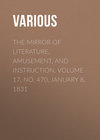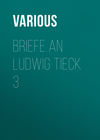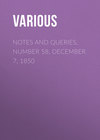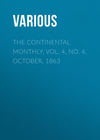Buch lesen: «The Mirror of Literature, Amusement, and Instruction. Volume 17, No. 470, January 8, 1831», Seite 7
A DOUBLE
(To the Editor.)
I read your story of the cherry-coloured cat. The clergyman with whom I was educated astonished me when a child, by saying, when at his living at –, he preached in a cherry-coloured gown and a rose-coloured wig (white.)
AN OLD ONE
PROPHECY OF LORD BYRON
In his journal, under the date of January 13, 1821, Lord Byron writes: "Dined—news come—the powers mean to war with the people. The intelligence seems positive—let it be so—they will be beaten in the end. The King-times are fast finishing. There will be blood shed like water, and tears like mist; but the people will conquer in the end. I shall not live to see it—but I foresee it."
HARDHAM'S 37
Snuff-takers generally, especially the patrons of Hardham's 37 will read the following record of benevolence with some gratification:—"In 1772, Mr. John Hardham, a tobacconist, in London, a native of Chichester, left by his will the interest of all his estates to the guardians of the poor, 'to ease the inhabitants in their poor-rates for ever.' This valuable legacy amounting to 653l. per annum was subject to the life of the housekeeper of the testator, so that it was not till 1786 that it reverted to the city."—This is even better than the plan for snuff-takers paying off the national debt.
PRESTON, LANCASTER
Preston is a market-town, borough, and parish; situated on the river Ribble, in the hundred of Amounderness, county palatine of Lancaster. It was incorporated by Henry II., in 1160; and the privileges and free customs granted by this and subsequent royal grants were confirmed by Charter of 36th Charles II. The body corporate consists of a mayor, recorder, seven aldermen, and seventeen capital burgesses, who, together, form the common council of the borough. The mayor, two town-bailiffs, and two sergeants are elected annually, upon the Friday preceding the festival of St. Wilfrid, who was formerly lord of this town; and they are invested, on the 12th of October following, by a jury of twenty-four guild burgesses. The members of the council, with the exception of the mayor, retain their seats for life, or during the pleasure of a majority, and vacancies are supplied by the remaining members. The town sends two representatives to parliament, and affords the nearest practical example of universal suffrage in the kingdom—every male inhabitant, whether housekeeper or lodger, who has resided six months in the town, and who has not, during the last twelve months, been chargeable to any township as a pauper, having a right to vote for two candidates at elections. This principle was established by a decision of the House of Commons, on an appeal, in the year 1766, and has ever since been acted upon. The burgesses are entitled, by the charter of Henry II., to have a GUILD MERCHANT, with the usual franchises annexed, of safe transit through the kingdom, exemption from toll, pontage, and stallage; liberty to buy and sell peaceably; and power to hold a guild for the renewal of freedom to the burgesses, the confirming of by-laws, and other purposes. This privilege is still made the occasion of great festivity. For a long time after their first institution, the guilds were held at irregular periods, but they have now, for more than a century, been uniformly celebrated every twentieth year, commencing on the Monday next after the Decollation of St. John, which generally happens in the last week of August; the last was held in 1822, and commenced on the 22nd of September. The amusements, which are of great variety, continue for a fortnight; but, for civic purposes, the guild books are open for one entire month. The corporation are obliged to hold this carnival, on pain of forfeiting their elective franchises, and their rights as burgesses. The guild appears to be of the nature of the ancient frank-pledge: it is of Saxon origin, and derived from the word gile, signifying money, by which certain fraternities enter into an association, and stipulate with each other to punish crimes, make losses good, and acts of restitution proportioned to offences;—for which purposes, they raised sums of money among themselves, forming a common stock; they likewise endowed chantries for priests to perform orisons for the defunct. Fraternities and guilds were, therefore, in use, long before any formal licenses were granted to them; though, at this day, they are a company combined together, with orders and laws made by themselves, under sanction of royal authority. The several trades of Preston are incorporated; twenty-five chartered companies go in procession on the guild festival.
W.G.C
EPIGRAM
Bob scrubs his head, in search of wit,
And calls his follies phrenzy fit;
But Bob forgets, with all his wit,
Poëta nascitur, non fit!
P.T
COMPLETION OF VOL. XVI
WITH THE PRESENT NUMBER
A SUPPLEMENTARY NUMBER,
With a Portrait of the Queen, and a Memoir of her Majesty; with Title-page, Preface, and Index to Vol. XVI.
*** Books are flocking fast around us. Among them are Mr. Boaden's Life of Mrs. Jordan—the Romance of History—Vols. 13 and 14 of Lardner's Cyclopaedia—Dr. Dibdin's Sunday Library—Vol 1 of the Cabinet Library—and three other volumes of the periodical libraries. Our preference of Moore's Byron is, we hope, borne out by its paramount interest.




















